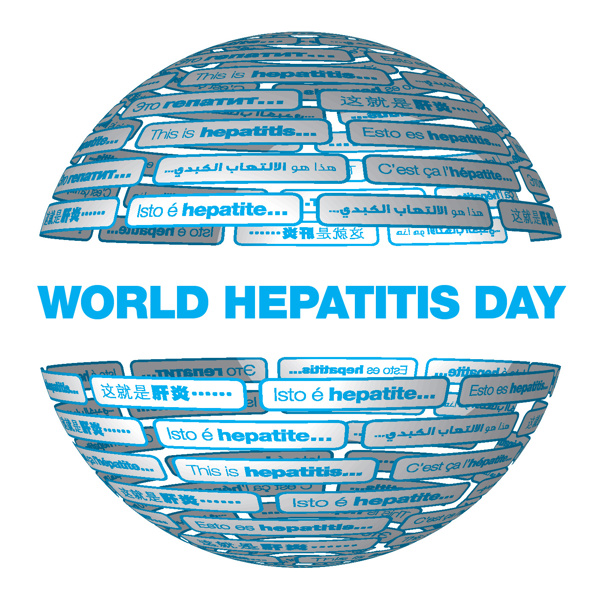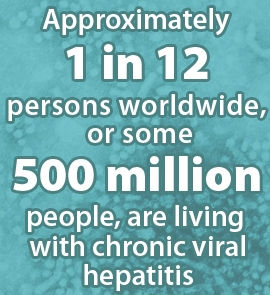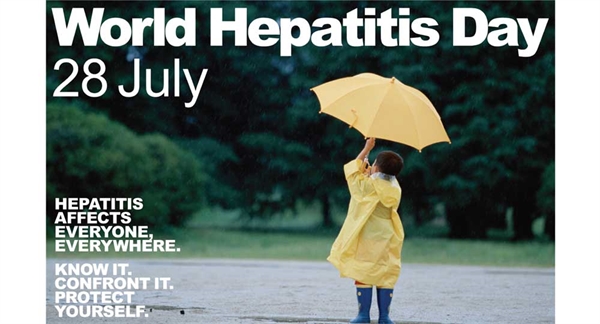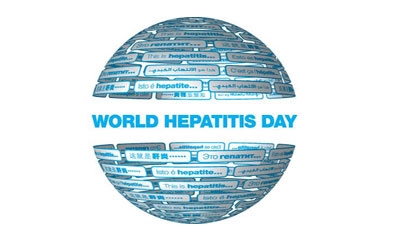World Hepatitis Day 2024 is on Sunday, July 28, 2024: Cure for Hepatitis C?
Sunday, July 28, 2024 is World Hepatitis Day 2024. World Hepatitis Day, observed on July 28 every year, aims to raise global awareness of hepatitis — a group of infectious diseases known as Hepatitis A, B, C, D, and E — and encourage prevention, diagnosis and treatment.

World Hepatitis Day, observed on July 28 every year, aims to raise global awareness of hepatitis — a group of infectious diseases known as Hepatitis A, B, C, D, and E — and encourage prevention, diagnosis and treatment.

Hi Jyoti Nagaraj.
Hepatitis is a general term that means inflammation of the liver. This inflammation can be caused by infection. Hepatitis can also be caused by exposure to alcohol, certain medications, chemicals, poisons, and other toxins, or by other diseases. Hepatitis C virus (HCV) is one of the many viruses that can cause inflammation of the liver.
Inflammation of the liver caused by infection with HCV is referred to as hepatitis C.
• If the inflammation is not reversed, it becomes chronic (ongoing, long term) and can cause chronic liver disease, which can be serious or even fatal.
• At least 75% of people infected with hepatitis C develop chronic hepatitis C.
• If the disease progresses to the point at which the liver begins to fail (end stage liver disease), the only treatment is liver transplantation.
Hepatitis C is an increasing public health concern in the United States and throughout the world.
• HCV is one of the most common causes of chronic liver disease in the United States and the most common cause of chronic viral hepatitis.
• It is believed to be the cause of about 15-20% of all cases of acute (new, short term) viral hepatitis and half of all cases of cirrhosis, end-stage liver disease, and liver cancer.
About 4 million people in the United States have antibodies to HCV, meaning they have been infected with the virus at some point; as many as half of them do not know they have the infection.
TREATMENT OF HEPATITIS C...Self-Care at Home
If you have symptoms, these measures will help you feel better faster.
• Take it easy; get plenty of rest.
• Drink plenty of fluids to prevent dehydration.
• Do not drink alcohol of any kind, including beer, wine, and hard liquor.
• Avoid medicines and substances that can cause harm to the liver such as acetaminophen (Tylenol) and other preparations that contain acetaminophen.
• Avoid prolonged, vigorous exercise until symptoms start to improve.
TREATMENT OF HEPATITIS C...Medical Treatment
If you are dehydrated, your health care provider may prescribe IV fluids to help you feel better.
If you are experiencing significant nausea and vomiting, you will receive medicines to help control these symptoms.
If your symptoms are well controlled, you can be cared for at home. If dehydration or other symptoms are severe or if you are showing signs of confusion or delirium, then you may be hospitalized.
The treatment that has shown the most promise in chronic hepatitis C is an agent called pegylated interferon alpha (Pegasys, PEG-Intron). This agent is often combined with an antiviral drug called ribavirin (Virazole).
• Decisions to start medications for treatment of hepatitis C are usually made in consultation with a gastroenterologist or liver specialist (hepatologist).
• The decision is based on the results of lab tests of liver function, on results of tests for HCV and liver biopsy, and on the person's age and general medical condition.
Certain medical conditions preclude the use of interferon.
• Depression and certain other mental and neurologic disorders
• Active alcohol or drug abuse
• Autoimmune diseases such as rheumatoid arthritis, systemic lupus erythematosus, or psoriasis
• Low blood hemoglobin level (anemia) or blood cell counts
• Cirrhosis that is severe enough to cause symptoms such as jaundice, wasting, fluid retention that causes swelling, or mental disturbances
Take Care. Regards.

is hepatitis b curable?
Hepatitis B is one of the most common infectious diseases in the world. The cause of hepatitis B is a virus that infects the liver.
Hepatitis B infections are either acute or chronic. Acute hepatitis B can last from a few weeks to a few months. Most people with acute infection will fully recover and not have any lasting health problems.
Chronic hepatitis B is more serious. A person with chronic hepatitis B may have the disease for life. Chronic hepatitis B can lead to more serious liver disease, including liver cancer. Some 15 to 25 percent of people with chronic hepatitis B will eventually die from liver disease1. It is urgent that people with or who are at risk of chronic hepatitis B visit their medical professional and get a hepatitis B blood test.
While chronic hepatitis B cannot be cured after infection, a medical professional can prescribe certain medications that can help manage the virus.
Hepatitis B is caused by a virus. The virus is passed from one person to another by blood and body fluids.
Hepatitis B is 100 times more contagious than HIV, the virus that causes AIDS.2 In addition, the hepatitis B virus can survive outside the body for at least seven days and still cause infection.3
Hepatitis B is transmitted from one person to another through blood and body fluids. This can happen during unprotected sex or when sharing needles and syringes with infected persons. People also can get hepatitis B through unclean needles when getting tattoos or body piercings. Barbers can spread the virus when using unclean razors.
Hepatitis B also can be passed from an infected woman to her newborn baby during childbirth. Of these newborns, 80 to 90 percent of them will be born with hepatitis B and will go on to develop chronic hepatitis B.4
People who live with an infected person are also at risk and should not share personal items such as razors, toothbrushes or nail clippers.
Medical professionals also are at increased risk for becoming infected and should follow proper procedures for using and disposing needles and blood products
People with chronic hepatitis B will have the infection for life. There is no cure for chronic hepatitis B once infected. However, there are medicines that can help manage the disease. You should ask your medical professional for advice on what medicines would work best for you.

How severely does Hepatitis B affect the world?
One third of the world's total population (2 billion) has been infected with hepatitis B virus. Most people develop natural immunity to HBV after acute (initial) infection.
There are approximately 350 million people with chronic (lifelong) HBV infection. About 78% (275 million) of chronically infected individuals reside in Asia or the Pacific Islands. In contrast, globally there are 170 million people with chronic hepatitis C and 40 million people with HIV/AIDS.
In many Asian countries, 10% (5-20%) of the population are chronically infected with HBV.
About 1 million people die each year (the equivalent of 2,800 deaths per day, 115 deaths per hour, or 1-2 deaths per minute) from liver cancer or liver failure caused by HBV.




